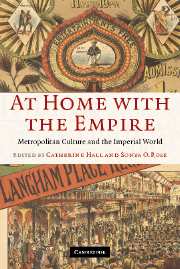Book contents
- Frontmatter
- Contents
- Notes on contributors
- 1 Introduction: being at home with the Empire
- 2 At home with history Macaulay and the History of England
- 3 A homogeneous society? Britain's internal ‘others’, 1800–present
- 4 At home with the Empire: the example of Ireland
- 5 The condition of women, women's writing and the Empire in nineteenth-century Britain
- 6 Sexuality and empire
- 7 Religion and empire at home
- 8 Metropolitan desires and colonial connections: reflections on consumption and empire
- 9 Imagining empire: history, fantasy and literature
- 10 New narratives of imperial politics in the nineteenth century
- 11 Bringing the Empire home: women activists in imperial Britain, 1790s–1930s
- 12 Taking class notes on empire
- 13 Citizenship and empire, 1867–1928
- Select bibliography
- Index
5 - The condition of women, women's writing and the Empire in nineteenth-century Britain
Published online by Cambridge University Press: 11 April 2011
- Frontmatter
- Contents
- Notes on contributors
- 1 Introduction: being at home with the Empire
- 2 At home with history Macaulay and the History of England
- 3 A homogeneous society? Britain's internal ‘others’, 1800–present
- 4 At home with the Empire: the example of Ireland
- 5 The condition of women, women's writing and the Empire in nineteenth-century Britain
- 6 Sexuality and empire
- 7 Religion and empire at home
- 8 Metropolitan desires and colonial connections: reflections on consumption and empire
- 9 Imagining empire: history, fantasy and literature
- 10 New narratives of imperial politics in the nineteenth century
- 11 Bringing the Empire home: women activists in imperial Britain, 1790s–1930s
- 12 Taking class notes on empire
- 13 Citizenship and empire, 1867–1928
- Select bibliography
- Index
Summary
In 1814 Maria Graham lamented the lack of ‘mutual understanding and mutual knowledge’ between the European residents and the indigenous inhabitants of India, and hoped to fill that gap with a popular introduction to Indian history, literature, science, religions and manners. She had sailed to India in 1809, and on her return published her Journal of a Residence in India (1812) and Letters on India (1814). In 1814 she looked back at the Journal as ‘liable to the reproach of European prejudice’. She had been shocked to find ‘Mussulman ladies … so totally void of cultivation’, and Hindus characterised by ‘passive submission … apathy and … degrading superstition’. But in the Letters, she used the language of eighteenth-century stadial theory, assuming a hierarchy of stages of development, and the tone was more informed, comparative and philosophical. She found in ancient Hindu civilisation ‘the maxims of that pure and sound morality which is founded on the nature of man as a rational and social being’. She expressed her greatest delight in the Mahabharata as ‘the pleasing light in which it places the early condition of the Hindu women, before the jealous Mahomedan maxims had shut them up in zenanas’.
Graham was only the third British woman to publish her observations on India, and her work had a mixed reception in Britain.
- Type
- Chapter
- Information
- At Home with the EmpireMetropolitan Culture and the Imperial World, pp. 101 - 121Publisher: Cambridge University PressPrint publication year: 2006
- 2
- Cited by



